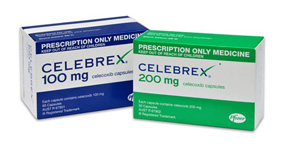 The prescription pain medication Celebrex has been linked to the dangerous side effect Stevens Johnson Syndrome.
The prescription pain medication Celebrex has been linked to the dangerous side effect Stevens Johnson Syndrome.
Manufactured by the Searle division of Pfizer Pharmaceuticals, Celebrex is a non-steroidal anti-inflammatory drug (NSAID). It was developed as an alternative painkiller that would have fewer adverse gastro-intestinal effects commonly associated with NSAID usage. Celebrex, (celecoxib), is believed by Pfizer-Pharmacia to specifically block cyclooxygenase-2, or COX-2, an enzyme made by the body, so it is known as a COX-2 selective inhibitor. It received approval from the U.S. Food and Drug Administration (FDA) in 1998.
Since its introduction to the market, Celebrex has been prescribed for people suffering from osteoarthritis, adult rheumatoid arthritis, and menstrual cramping. However, in 2002 the FDA received reports from Pfizer documenting a number of reported cases of Stevens Johnson Syndrome and toxic epidermal necrolysis (TEN) among Celebrex users.
Stevens Johnson Syndrome is a rare condition. It is estimated that only 300 cases of Stevens Johnson Syndrome are diagnosed in the United States per year. With such small odds, and like many popular medications, Celebrex’s label does not include warnings for the potential risk of SJS.
According to eHealthMe, a site studying pharmaceutical information via FDA and social media sites, of 72,809 people who have side effects while taking Celebrex, 521 of them have had Stevens Johnson syndrome. Celebrex SJS sufferers amount to 0.39 percent of users. Interestingly, findings show that women are more frequent sufferers of SJS from Celebrex than men, with cases occurring at a two to one (2:1) ratio.
What is Stevens Johnsons Syndrome?
Although the cause is often unknown, Stevens-Johnson syndrome is usually a specific type of allergic reaction in response to medication or infection. In SJS, cell death causes the epidermis to separate from the dermis.
Characterized by brightly colored skin lesions, it usually appears about a week after the patient first takes the medication. Victims can suffer permanent scarring, and serious eye problems, such as severe conjunctivitis, corneal blisters and corneal holes. In some cases, SJS can lead to severe vision loss. TEN comes with the same symptoms, but the lesions can cover up to 90 percent of the patient’s body.
Almost any drug — but most particularly sulfa drugs — can cause SJS. The allergic reaction to the drug may not occur until 7-14 days after first using it. SJS can be preceded by a viral infection, and accompanying flu-like symptoms. SJS and TEN are treated with the utmost urgency when diagnosed and require hospitalization, often in the burn unit.
Treatments focus on discovering and eliminating the underlying cause, if possible, controlling symptoms and minimizing complications. Depending on the severity of the SJS, recovery can take several weeks to several months. But treatment is key as both SJS and TEN can be fatal.
About one-third of all patients diagnosed with SJS have recurrences of the disease. The condition is more common in adults than in children, although it can develop in people at any age.
In general, SJS lawsuits are filed individually by each plaintiff and are not class actions.
Do YOU have a legal claim? Fill out the form on this page now for a free, immediate, and confidential case evaluation. The attorneys who work with Top Class Actions will contact you if you qualify to let you know if an individual lawsuit or class action lawsuit is best for you. Hurry — statutes of limitations may apply.
ATTORNEY ADVERTISING
Top Class Actions is a Proud Member of the American Bar Association
LEGAL INFORMATION IS NOT LEGAL ADVICE
Top Class Actions Legal Statement
©2008 – 2025 Top Class Actions® LLC
Various Trademarks held by their respective owners
This website is not intended for viewing or usage by European Union citizens.
Get Help – It’s Free
Help for Victims of Stevens Johnson Syndrome
If you or a loved one were diagnosed with Stevens Johnson Syndrome (SJS) or toxic epidermal necrolysis (TEN) after taking a prescribed or over-the-counter medication, you may be eligible to take legal action against the drug’s manufacturer. Filing an SJS lawsuit or class action lawsuit may help you obtain compensation for medical bills, pain and suffering, and other damages. Obtain a free and confidential review of your case by filling out the form below.
An attorney will contact you if you qualify to discuss the details of your potential case at no charge to you.
Oops! We could not locate your form.












